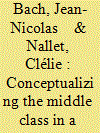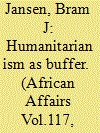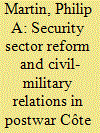|
|
|
Sort Order |
|
|
|
Items / Page
|
|
|
|
|
|
|
| Srl | Item |
| 1 |
ID:
160892


|
|
|
|
|
| Summary/Abstract |
The category ‘middle class’ was used increasingly throughout the 2010s to identify social changes occurring in African countries, including Ethiopia. However, the category itself is hard to define and has been employed to describe very diverse socio-economic dynamics. This article offers an original way of considering the ‘middle class’, focusing on what the category is expected to produce for the different actors utilizing it. We argue that the debate on ‘middle class’ social composition cannot be undertaken before deconstructing and discussing why, how and by whom the category is being used. As the notion of the middle class is subjectively and locally produced in every country, we focus on the perceptions and narrative of the category by external and internal actors and the specific political implications of such views in the Ethiopian context. By analyzing the international discourses and the Ethiopian leadership’s views, we demonstrate the fluidity of a notion deeply rooted in and interpreted based on specific institutional, ideological, and social backgrounds, and at the same time serving specific economic and political ambitions. In this regard, the Ethiopian case reveals how divergent actors have been promoting that same category with great differences in their interpretation and expectations. We thus argue that the category ‘middle class’ remains analytically useful only if not considered as an objective socio-economic category, but rather as a politically constructed category.
|
|
|
|
|
|
|
|
|
|
|
|
|
|
|
|
| 2 |
ID:
160889


|
|
|
|
|
| Summary/Abstract |
This article explores how the humanitarian presence and programs in the disputed border area of Abyei between Sudan and South Sudan can be understood as a buffer between conflicting parties, rather than as mere assistance to a displaced population. It aims to contribute to debates about the spatial impact of humanitarian governance and the politicization of aid in protracted crisis contexts, and specifically in relation to territorial disputes and border struggles. It is based on ethnographic fieldwork in South Sudan between 2011 and 2013. The article argues that the humanitarian response became part of the politics of belonging that lies at the heart of the dispute. The very acts of labelling, categorizing, and maintaining the subjects of aid are highly political, such as the creation of the category of the ‘people of Abyei’ in contrast to refugees or Internally Displaced People. As a result, the interventions have sustained governance over the territory and can be understood as a humanitarian buffer that may shape the border area of Abyei for many years to come.
|
|
|
|
|
|
|
|
|
|
|
|
|
|
|
|
| 3 |
ID:
160890


|
|
|
|
|
| Summary/Abstract |
Since 2012, Mogadishu has been the site of both unprecedented optimism around the reconstruction of the Somali state, as well as persistent violence perpetrated by the Islamist militants of Harakat Al Shabaab Al Mujahidiin (Al Shabaab). In attacking hotels and restaurants, as well as other sites broadly associated with the state, Al Shabaab has prosecuted a strategy intended to foment the un-governability of the city, undermine the nascent Federal Government of Somalia’s claims to authority, and denounce the alleged ‘foreign’ capture of the re-emerging state. Based on discursive analyses of local political commentary, and fieldwork in Mogadishu, this article examines media contestation between the re-emerging state and the armed opposition in a context of prolonged political fragmentation. The article argues that not only does the highly decentralized and transnational modern media environment facilitate a dynamic and dialogic exchange of propaganda between the state and the insurgents but, furthermore, the technological context of this discursive contestation has important implications for the ways in which counter-terrorism and state reconstruction are undertaken by political and military actors on the ground.
|
|
|
|
|
|
|
|
|
|
|
|
|
|
|
|
| 4 |
ID:
160888


|
|
|
|
|
| Summary/Abstract |
The article comparatively analyses Franco-Burundian and Franco-Rwandan relations during the 1970s and the first half of the 1980s. From the 1970s, the two former Belgian colonies were integrated into the complex political, economic, cultural and military system that France implemented with its former colonies. By the mid-1980s, Paris achieved a formal co-optation of the two states in the traditional Franco-African order, with more success in Rwanda than in Burundi. Nevertheless, in both cases this co-optation was partial: the interconnections between Paris, Bujumbura and Kigali in 1985 were not as intense and as close as the other traditional Franco-African bonds. The article explores the process of inclusion of the two states in the pré carré africain français. The purpose is to highlight the main features of the relationship between Paris, Bujumbura and Kigali and to evaluate the results achieved by 1985 through an historical and in-depth analysis. The article contributes significantly to existing knowledge on Franco-African relations, and provides a better understanding of the Franco-Burundian and Franco-Rwandan dynamics that emerged in the early 1990s.
|
|
|
|
|
|
|
|
|
|
|
|
|
|
|
|
| 5 |
ID:
160894


|
|
|
|
|
| Summary/Abstract |
In 2011, Côte d’Ivoire emerged from a protracted politico-military crisis not through peace negotiations, but thanks to the military defeat of former president Laurent Gbagbo and his associates. Relatively little has been written about the restoration of peace after a decisive military victory and about experiences of post-conflict reconstruction where the international community does not play a leading role. This article argues that three challenges are particularly important. Victors have to maintain cohesion within the winning coalition and to co-opt or repress residual resistance from the vanquished if they want to consolidate their rule. Moreover, former insurgents often struggle to implement their vision of post-conflict governance. In Côte d’Ivoire, the winning coalition showed risks of implosion after 2011, but has remained cohesive. The Ouattara administration has been able to develop its own vision, drawing from Ivorian political tradition and the president’s distinctive personality. However, this political project faces future obstacles, particularly in view of Ouattara’s probable retirement from politics in 2020.
|
|
|
|
|
|
|
|
|
|
|
|
|
|
|
|
| 6 |
ID:
160895


|
|
|
|
|
| Summary/Abstract |
This Research Note reflects on the question of representing marginalized people’s voices by discussing field research based on open-ended narrative interviews with rural populations that had been displaced by natural resource extraction in Mozambique. It highlights the methodological challenges of representing narratives of the marginalized by discussing several aspects of the politics of narrative. On the one hand, narratives that emerge in fieldwork encounters are contingent articulations of oneself that unfold through the implicit negotiation process between a researcher and a research participant. On the other hand, these narratives are embedded in broader socio-material relationalities. Through this discussion, the Research Note demonstrates how these methodological aspects of the politics of narrative should be reflected upon as a way to navigate complex ontological narratives that emerge in one’s fieldwork, as well as highlights how this narrative reading overcomes the potential danger of fetishizing individual agency and/or overlooking broader structural inequalities.
|
|
|
|
|
|
|
|
|
|
|
|
|
|
|
|
| 7 |
ID:
160891


|
|
|
|
|
| Summary/Abstract |
This article explores how the present socio-economic crisis in Mozambique is linked to the prospects of natural resource windfalls for the country. Drawing on the political settlement approach, it explores how the distribution of power both within and outside the ruling elite is structured and consequently how the underlying political processes have been shaped by the expectations of natural resource windfalls. The article argues that the present socio-economic crisis in Mozambique is not due to national resource assets in themselves. Instead, the political and economic downturn in Mozambique should be understood as a manifestation of how the political settlement has been organized and rent mobilization controlled by the ruling elite. To understand how the prospect of rents from natural resource sectors have influenced the political settlement, we have argued that one has to look at the dynamics of power both within and outside the ruling elite and the incentives they create for elites to use the control of power and access to economic benefits to achieve narrow and short-term gains rather than inclusive and longer-term goals.
|
|
|
|
|
|
|
|
|
|
|
|
|
|
|
|
| 8 |
ID:
160893


|
|
|
|
|
| Summary/Abstract |
There is a common perception that Ethiopia is unusual in Africa in having a relatively uniform system of state land ownership. While highly influential, state ownership is not the only body of law with implications for land administration. This article argues that the institutionalization of ethnic federalism and the persistence of neo-customary tenure result in considerable ambiguity, particularly regarding the land rights of non-indigenous minorities. The analysis highlights tensions between these three sets of land tenure institutions—state ownership, ethnic federalism and neo-customary tenure—and their implications for minority land rights. A case study of land-based conflict in Oromiya region, based on fieldwork conducted in 2009 and 2010, demonstrates the continuing relevance of these land tenure institutions and associated ideas in land debates in Ethiopia, both in terms of the use of these ideas by protagonists as means of justifying land claims, and the ambiguous state response to the conflict, which goes well beyond the provisions of the land policy. As such, while there are certainly particular characteristics of the Ethiopian case, many of the key issues regarding ethnicity and land mirror debates taking place across the continent.
|
|
|
|
|
|
|
|
|
|
|
|
|
|
|
|
| 9 |
ID:
160896


|
|
|
|
|
| Summary/Abstract |
ON JUNE 30, 2017, THE UNITED NATIONS OPERATION in Côte d’Ivoire (ONUCI) reached the end of its mandate after fourteen years of peacekeeping operations. UN officials and Ivorian national leaders framed ONUCI’s departure as another positive step in the country’s postwar recovery, declaring that the return to peace was ‘irreversible’.1 In some ways, this enthusiasm appeared warranted. Since the end of the Second Ivorian Civil War in 2011, which culminated in the arrest of former President Laurent Gbagbo by rebel troops formerly known as the Forces nouvelles, the country has experienced rapid economic recovery: GDP growth averaged 9 percent from 2012 to 2016.2 Government and UN officials have touted the success of the country’s disarmament, demobilization, and reintegration (DDR) programme, which officially processed over 60,000 ex-combatants between 2012 and 2015.3 Within the country’s armed forces, officials point to the integration of former rebels and pro-Gbagbo elements within unified military units as further evidence that Côte d’Ivoire is a model of peacebuilding and security sector reform to be emulated by Africa’s other conflict-torn states.4
|
|
|
|
|
|
|
|
|
|
|
|
|
|
|
|
|
|
|
|
|